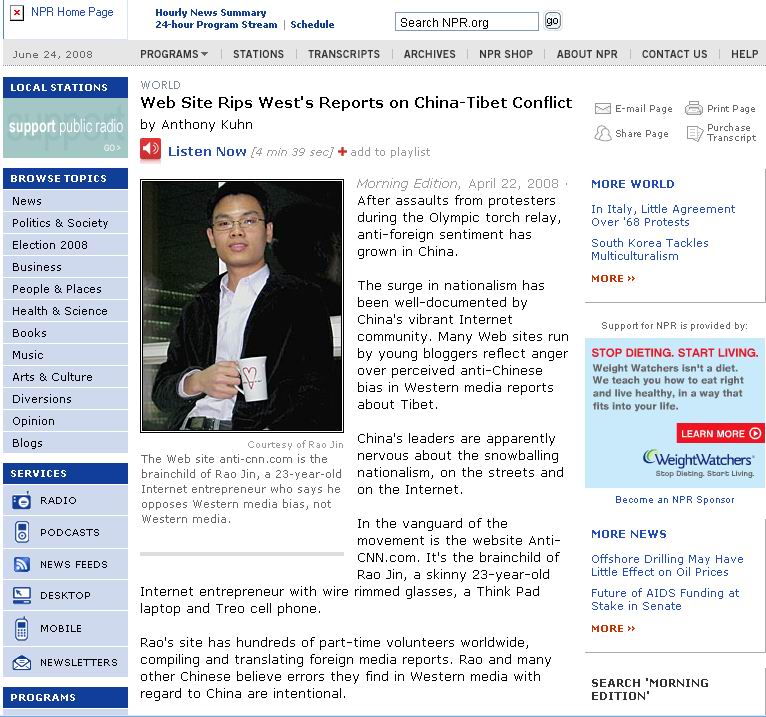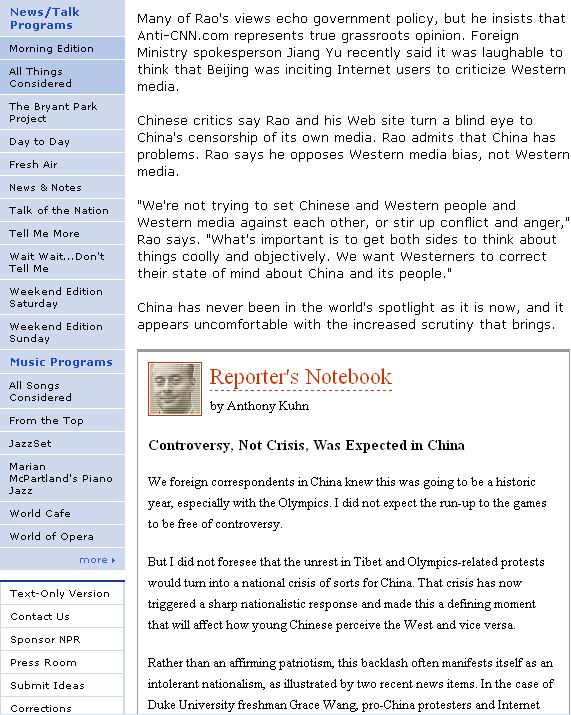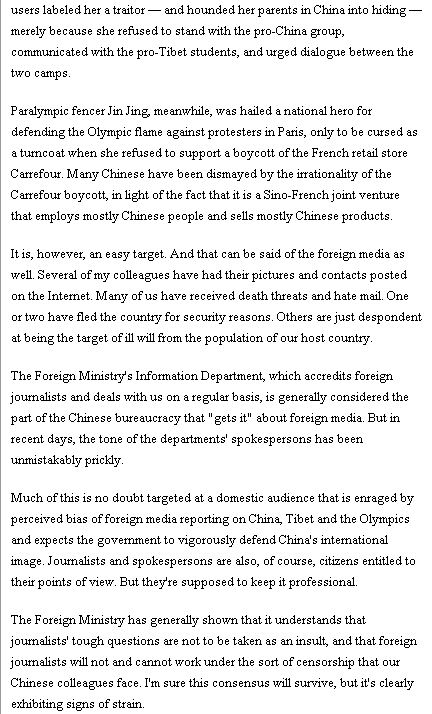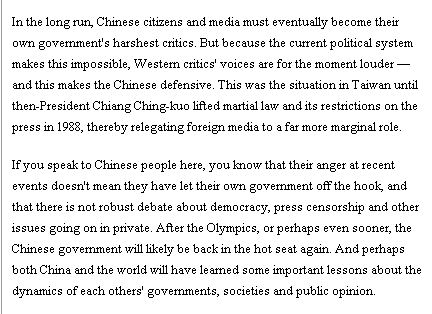|
|
外文主流媒体对Anti-CNN.com 相关报道翻译帖(七)
【原文連接】http://www.npr.org/templates/story/story.php?storyId=89831099
【翻译】末末的快乐
【声明】本文翻译仅供Anti-CNN内部使用,谢绝转载!
【原文】
Web Site Rips West's Reports on China-Tibet Conflict
by Anthony Kuhn
Picture:The Web site anti-cnn.com is the brainchild of Rao Jin,
a 23-year-old Internet entrepreneur who says
he opposes Western media bias, not Western media.
Morning Edition, April 22, 2008 · After assaults from protesters during the Olympic torch relay, anti-foreign sentiment has grown in China.
The surge in nationalism has been well-documented by China's vibrant Internet community. Many Web sites run by young bloggers reflect anger over perceived anti-Chinese bias in Western media reports about Tibet.
China's leaders are apparently nervous about the snowballing nationalism, on the streets and on the Internet.
In the vanguard of the movement is the website Anti-CNN.com. It's the brainchild of Rao Jin, a skinny 23-year-old Internet entrepreneur with wire rimmed glasses, a Think Pad laptop and Treo cell phone.
Rao's site has hundreds of part-time volunteers worldwide, compiling and translating foreign media reports. Rao and many other Chinese believe errors they find in Western media with regard to China are intentional.
Many of Rao's views echo government policy, but he insists that Anti-CNN.com represents true grassroots opinion. Foreign Ministry spokesperson Jiang Yu recently said it was laughable to think that Beijing was inciting Internet users to criticize Western media.
Chinese critics say Rao and his Web site turn a blind eye to China's censorship of its own media. Rao admits that China has problems. Rao says he opposes Western media bias, not Western media.
"We're not trying to set Chinese and Western people and Western media against each other, or stir up conflict and anger," Rao says. "What's important is to get both sides to think about things coolly and objectively. We want Westerners to correct their state of mind about China and its people."
China has never been in the world's spotlight as it is now, and it appears uncomfortable with the increased scrutiny that brings.
=====================================================
Reporter's Notebook
by Anthony Kuhn
Controversy, Not Crisis, Was Expected in China
We foreign correspondents in China knew this was going to be a historic year, especially with the Olympics. I did not expect the run-up to the games to be free of controversy.
But I did not foresee that the unrest in Tibet and Olympics-related protests would turn into a national crisis of sorts for China. That crisis has now triggered a sharp nationalistic response and made this a defining moment that will affect how young Chinese perceive the West and vice versa.
Rather than an affirming patriotism, this backlash often manifests itself as an intolerant nationalism, as illustrated by two recent news items. In the case of Duke University freshman Grace Wang, pro-China protesters and Internet users labeled her a traitor — and hounded her parents in China into hiding — merely because she refused to stand with the pro-China group, communicated with the pro-Tibet students, and urged dialogue between the two camps.
Paralympic fencer Jin Jing, meanwhile, was hailed a national hero for defending the Olympic flame against protesters in Paris, only to be cursed as a turncoat when she refused to support a boycott of the French retail store Carrefour. Many Chinese have been dismayed by the irrationality of the Carrefour boycott, in light of the fact that it is a Sino-French joint venture that employs mostly Chinese people and sells mostly Chinese products.
It is, however, an easy target. And that can be said of the foreign media as well. Several of my colleagues have had their pictures and contacts posted on the Internet. Many of us have received death threats and hate mail. One or two have fled the country for security reasons. Others are just despondent at being the target of ill will from the population of our host country.
The Foreign Ministry's Information Department, which accredits foreign journalists and deals with us on a regular basis, is generally considered the part of the Chinese bureaucracy that "gets it" about foreign media. But in recent days, the tone of the departments' spokespersons has been unmistakably prickly.
Much of this is no doubt targeted at a domestic audience that is enraged by perceived bias of foreign media reporting on China, Tibet and the Olympics and expects the government to vigorously defend China's international image. Journalists and spokespersons are also, of course, citizens entitled to their points of view. But they're supposed to keep it professional.
The Foreign Ministry has generally shown that it understands that journalists' tough questions are not to be taken as an insult, and that foreign journalists will not and cannot work under the sort of censorship that our Chinese colleagues face. I'm sure this consensus will survive, but it's clearly exhibiting signs of strain.
In the long run, Chinese citizens and media must eventually become their own government's harshest critics. But because the current political system makes this impossible, Western critics' voices are for the moment louder — and this makes the Chinese defensive. This was the situation in Taiwan until then-President Chiang Ching-kuo lifted martial law and its restrictions on the press in 1988, thereby relegating foreign media to a far more marginal role.
If you speak to Chinese people here, you know that their anger at recent events doesn't mean they have let their own government off the hook, and that there is not robust debate about democracy, press censorship and other issues going on in private. After the Olympics, or perhaps even sooner, the Chinese government will likely be back in the hot seat again. And perhaps both China and the world will have learned some important lessons about the dynamics of each others' governments, societies and public opinion.
==================================
【原始页面】




【中文译文】
网站抨击西方就中藏冲突的报道
记者:Anthony Kuhn
图:anti-cnn.com网站由饶瑾创建,这位23岁的互联网企
业家表示他反对的是西方媒体的偏见而不是西方媒体本身。
2008-04-22, 早报 : 在火炬传递期间受到抗议者的滋扰之后,排外情绪在中国不断增长。
活跃的中国网络社区就是这一激荡的民族主义情绪的良好佐证。对于西方媒体关于西藏报道中针对中国的偏见,许多年轻博客开设的网站表达了愤慨。
中国领导人也表现出对坊间和互联网上迅速高涨的民族主义浪潮的担心。
这一运动的先锋就是反CNN网站。该网站的创始人是饶谨。这位23岁的网络企业家身材消瘦,戴着金边眼镜,使用联想Think Pad笔记本电脑以及奔迈Treo手机。
饶的网站上有数百名世界各地的兼职志愿者进行外媒报道的编译工作。饶和其他许多中国人相信,他们从西方媒体关于中国的报道中找出的错误具有普遍性。
饶的许多观点与政府政策一致,不过他坚称,反CNN网站反应了真实的草根阶层的观点。外交部发言人姜瑜近期表示,那些中国政府鼓动网民批判西方媒体的观点是荒唐可笑的。
中国的批评家们批评饶谨及其网站对中国自身的媒体审查视而不见。饶谨承认中国自身确实存在问题,然而他反对的是西方媒体的偏见而不是西方媒体本身。
“我们并不打算把中国与西方人民和媒体对立起来,也不想煽动纷争与愤怒情绪。” 饶谨说,“重要的是让双方都冷静客观地思考问题。我们只想西方人能够更正他们对中国及其人民的看法。”
中国从未如现在这般举世瞩目,显然它对随之而来的变本加厉的严苛感到不适。
==================================
记者札记
记者:Anthony Kuhn
中国期待论战,而不是危机
我们这些在中国的特派记者都知道,这将是历史性的一年,尤其还跟奥运联系在了一起。我并不希望奥运之前的这段时间受到论战的影响。
但是我没有预料到西藏动乱和与奥运有关的抗议活动会转变为中国的全国性的危机。这个危机引发了强烈的民族主义回应,并使其成为一个清晰的时刻,会影响到中国的年轻人怎样理解西方,反之亦然。
正如近期的两则新闻阐明的那样,这种情绪高涨的行为通常显示出其本身是不容异议的民族主义而不是坚定的爱国主义。在杜克大学一年级学生Grace Wang(指王千源)的事件中,亲中国的抗议者和网民给她贴上了卖国贼的标签,逼得其父母躲藏起来,仅仅因为她拒绝站在亲中国的队伍里,并与亲西藏的学生进行交流,还敦促两个阵营的人展开对话。
与此同时,残奥会击剑运动员金晶在巴黎与抗议者对抗保护奥运圣火而被誉为民族英雄,当她拒绝支持针对法国零售商家乐福的抵制时却别咒骂成叛徒。许多中国人震惊于对家乐福的荒唐抵制,已经意识到这是一个中法合资企业,大部分的雇员都是中国人,卖的也都是中国的产品。
这是一个明显的目标,同样能被称为是外国媒体。我有好几个同事的照片和联系方式已经被贴到了网上。我们中不少人都收到了死亡威胁和仇恨信件。有一两个人已经由于出于安全原因逃离了这个国家。其他人则很苦恼成为东道国民众不友好的目标。
负责委派外国记者并定期与我们打交道的外交部新闻中心通常被认为是中国官僚体系的一部分,经常对外国媒体敷衍了事。但最近几天,该部新闻发言人的语气明显已经尖锐起来。
无疑,这主要是针对国内听众而说的。意识到外国媒体对中国,西藏,奥运的报道存有偏见,中国民众被激怒了,希望政府奋力维护中国的国际形象。记者和新闻发言人当然有表达自己观点的公民权利,但是他们的观点应该是专业性质的。
外交部表示,其明白记者的严厉提问不应该被认为是不敬的,同时也说到,外国记者不会也不可能理解中国同行们面对的那种文字出版物的审查。我很肯定,我们的看法一致,但是这明显表现出紧张的征兆。
从长远看来,中国的公民和媒体必须逐渐成为其自己政府的最严厉的批评者。但由于现阶段的政治体系,这样做还不可能。此刻,西方评论家的声音更大些,这让中国人戒心十足。这就是台湾在1988年以前的情形。当时的“总统”蒋经国解除对新闻界的军事管制和限制,从而使外国媒体变得无足轻重了。
假如你跟这里的中国人对话,你就知道他们对近期事件的愤怒并不是说他们就让政府转忧为喜了。对于民主,新闻知情权和其它的争论点,私下里没有进行激烈的辩论。奥运会之后,也许更快一些,中国政府很有可能重新回到那种难堪的处境。又或者对于政府之间的相互影响,社会团体和公众观点,中国与整个世界都会从中学到一些重要教训。
==================================
[ 本帖最后由 末末的快乐 于 2008-7-2 16:46 编辑 ] |
评分
-
1
查看全部评分
-
|